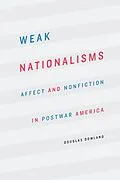The question "What is America?" has taken on new urgency. Weak Nationalisms explores the emotional dynamics behind that question by examining how a range of authors have attempted to answer it through nonfiction since the Second World War, revealing the complex and dynamic ways in which affects shape the literary construction of everyday experience in the United States. Douglas Dowland studies these attempts to define the nation in an eclectic selection of texts from writers such as Simone de Beauvoir, John Steinbeck, Charles Kuralt, Jane Smiley, and Sarah Vowell. Each of these texts makes use of synecdoche, and Weak Nationalisms shows how this rhetorical technique is variously driven by affects including curiosity, discontent, hopefulness, and incredulity. In exploring the function of synecdoche in the creative construction of the United States, Dowland draws attention to the evocative politics and literary richness of nationalism and connects critical...
Zusammenfassung
Weak Nationalisms explores the complex and dynamic ways in which emotions shape the post–World War II writing of the United States and argues that reading these narratives for their affects is to read for the emotional work that takes place between the part and the whole. Douglas Dowland employs a methodology that combines innovations in affect theory with traditional close reading practices to examine nonfiction texts by Simone de Beauvoir, John Steinbeck, Charles Kuralt, and Sarah Vowell and present the ways these writers negotiate nationalism in the United States. By reading these texts for their affects, Dowland makes visible the otherwise unseen rhetorical strategies that buttress the literary construction of the United States in contemporary nonfiction and articulates the function of synecdoche in establishing "weak nationalisms." Dowland examines how, as they write about otherwise plain objects in order to evoke and describe the entire nation, these authors both embrace core tenets of liberalism in the United States and resist the hierarchies often associated with nationalism. In showcasing how synecdoche creates affective intensities, Weak Nationalisms challenges a popular conception in literary history that nonfiction narratives of the United States merely reflect the period of their production, renews questions literary criticism asks of texts, and offers new ways in which close reading answers these questions. Further, Dowland broadens the scope of close reading with affect theory and thereby enlivens the study of texts that literary criticism might otherwise dismiss as mere receptacles of strong nationalism. In the end, this book calls upon criticism to deal more attentively to the affects of texts, regardless of their genre, and to do so in a way that appreciates the open-ended, plural, analogic nature of the emotions.
